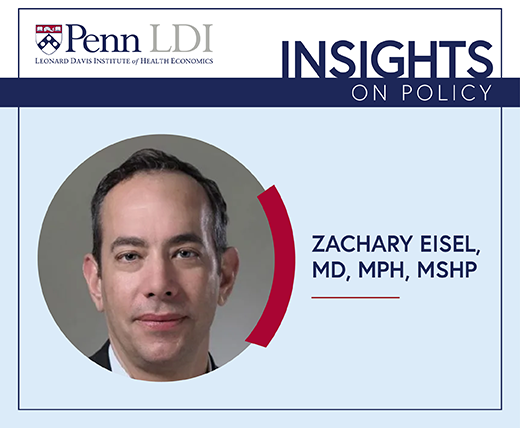
Over 500 U.S. Hospitals Have Stopped Delivering Babies Since 2010
A Crisis in Maternal Care is Unfolding—and it’s Hitting Rural and Urban Communities Alike
Blog Post

In a deal that would potentially limit patients’ choice of providers while bringing a major national player to Central Pennsylvania, Danville-based Geisinger Health recently agreed to be acquired by a new Kaiser Permanente subsidiary called Risant Health.
Risant’s aim is to acquire five or six hospital systems to expand value-based payments—those based on improving patient health—with a goal of surpassing $30 billion in revenue over the next five years. This deal resembles acquisitions by other companies like UnitedHealth Group and CVS that have also been expanding the links between their insurance units and health care providers.
In Kaiser’s case, it is able to offer its resources to smaller nonprofit systems like Geisinger, gaining a foothold in new markets and–Kaiser’s leaders hope–performing better than in past expansions on the East Coast.
The acquisition comes as systems are now merging with hospital groups in other geographic markets. These so-called ‘cross market’ mergers are raising questions about what impact they will have on health care.
“We know that typical health care mergers come at a cost–they raise prices without improving quality of care. Current evidence suggests we should question the benefits of a cross-market merger as well,” said Rachel M. Werner, Executive Director of Penn LDI.
One concern with Geisinger’s acquisition is how seamlessly these two nonprofits will be able to cooperate under Risant. Kaiser is an integrated insurer-delivery system that does not negotiate with hospitals or providers, because it owns them. By contrast, Geisinger is a blended model that owns hospitals, offers its own insurance plans, and negotiates with other insurers.
Another concern is whether Geisinger will continue to exercise autonomy on how to best serve its community going forward as one subsidiary in such a vast enterprise. Last year, Geisinger earned $6.9 billion in revenue compared to Kaiser’s $95.4 billion, suggesting a potential power imbalance. Nonetheless, Geisinger will keep its name, and Jaewon Ryu, Geisinger’s current CEO, will become Risant’s CEO, suggesting that Geisinger will at least have a seat at the table.
To get a better idea of how the formation of Risant might play out, we asked LDI Senior Fellows Mark V. Pauly, Paula Chatterjee, and Atul Gupta for their thoughts.
Mark V. Pauly: The merger seems set up for Geisinger to be independent, kind of like Hong Kong relative to China. That may not go well.
Paula Chatterjee: On one hand, the geographic separation between the entities may make it easier for them to stay local and dig into their markets with the full force of the merger’s resources. On the other, the governance details of the merged relationship are still being figured out, so the extent to which their priorities will be centralized is unclear.
Atul Gupta: I don’t expect Geisinger to expand its footprint beyond Pennsylvania in the near future, but I do expect changes in the way Geisinger’s operations will be run. Kaiser will probably try to (and should, in my opinion) harmonize the way things are done at Geisinger with its other facilities. That will help identify superfluous costs as well as get scale benefits. This may conflict with “Geisinger values” and they will have to accommodate these changes as the two organizations navigate becoming one entity. If there is a serious clash in cultures then the merger may perform badly and senior management at Geisinger may get disgruntled and leave soon after the deal is completed. Since Geisinger’s CEO is staying in place, I don’t expect this to happen.
Mark V. Pauly: The pattern of one health system in one part of the country acquiring another is not novel. Kaiser is attempting to transplant their structure of integration of health care delivery with insurance–the closed panel Health Maintenance Organization (HMO) model–to Geisinger. Kaiser has not been able to make their model work in the East when they have tried to do it themselves, so apparently, they hope that this well-regarded and already established health system can make the transfer work better. Most of Geisinger’s current customers may not prefer the full HMO model, however.
Atul Gupta: The main unique feature of this deal is that two vertically integrated players operating in different geographies are coming together as one legal entity. Kaiser has wanted to grow beyond California for a long time but has not been successful in its quest. I wouldn’t say they are creating a unique model since both entities already exist and all indications are that Geisinger will continue to operate as it has been before the deal. Based on what they have revealed so far, Kaiser plans to acquire other integrated providers around the country and build a national footprint. That will take a long time and a lot of deals to create a nationwide presence. This deal may also infuse some cash into Geisinger and help it to expand its footprint across Pennsylvania. It may also benefit from Kaiser’s scale in lowering costs and potentially adopting Kaiser’s clinical processes which are known to deliver great outcomes.
Mark V. Pauly: These kinds of merging partners always claim that. They have not been able to achieve these goals yet.
Paula Chatterjee: I’m generally skeptical that mergers will have positive spillover effects for health equity. This is based on prior work showing that nonprofit hospitals don’t actually spend more on community benefits once they get acquired. In fact, their spending on population health went down after acquisition.
Atul Gupta: Well, they have to claim some benefits for entities other than themselves, don’t they? Merging parties always claim some operating cost reductions that they will pass on to consumers in the form of lower prices as well as more community investments. I have found in my own research that hospitals do obtain operating cost benefits or “merger efficiencies,” but I have not seen evidence yet that these reductions are passed through to consumers. We should expect to see higher prices for insurers and consumers even though there is no market overlap between the two parties. In our work we have found that prices increase even in “out-of-market” mergers. Other studies have also found similar results. I expect Geisinger will benefit a lot from Kaiser’s expertise and scale. The main benefit for Kaiser seems to be that they get a foothold in the mid-Atlantic region. Next, they may try to expand beyond Pennsylvania and move into New Jersey or New York.
Mark V. Pauly: No. There is no other system like Kaiser, but it has not swept the field in California or Washington state, so there’s no reason to expect a big splash in Wilkes-Barre. Geisinger is already dominant there.
Paula Chatterjee: Yes. I think this merger, if approved, will have mass appeal. It seems to represent the growing recognition of the fluidity of health care markets and the desire for health systems to pool risk as broadly as possible.
Mark V. Pauly: It will probably be approved after some hand-wringing. Kaiser has a lot of friends.
Paula Chatterjee: This is the million, perhaps even billion, dollar question. I’m not quite sure. Last year, one of the largest cross-market mergers between Advocate Aurora Health and Atrium Health went unchallenged, but that may not be a good marker for how the Federal Trade Commission (FTC) is going to approach cross-market mergers in the future, especially one that involves such high-profile, branded entities.
Atul Gupta: Yes, I expect it to be approved. Since there is no market overlap between Kaiser and Geisinger, the deal should not raise a red flag with regulators. These two firms also have good reputations and are known for their excellence in care, so price gouging concerns will not be top of mind. Geisinger has a good rapport with Pennsylvania regulators and I expect Kaiser similarly has a good relationship with California agencies. I wouldn’t be surprised if regulators see this as a good development.



A Crisis in Maternal Care is Unfolding—and it’s Hitting Rural and Urban Communities Alike

Research Memo: Delivered to House Speaker Mike Johnson and Majority Leader John Thune

Research Memo: Delivered to House Speaker Mike Johnson and Majority Leader John Thune

Historic Coverage Loss Could Cause Over 51,000 People to Lose Their Lives Each Year, New Analysis Finds
Research Brief: New Incentive Structures and Metrics May Improve Program Performance

Research Memo: Response to Request for Technical Assistance